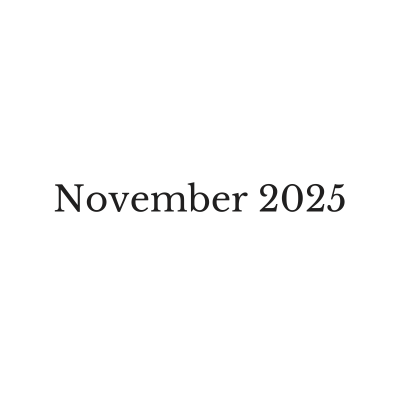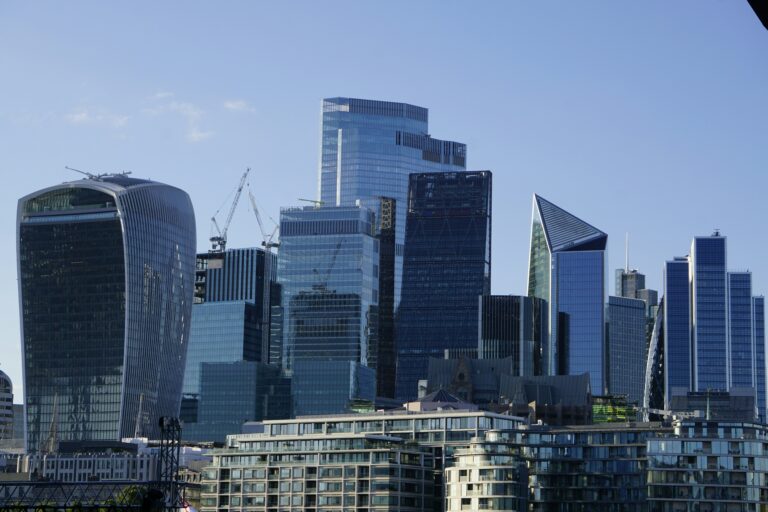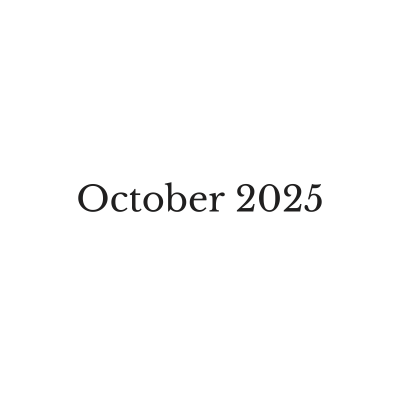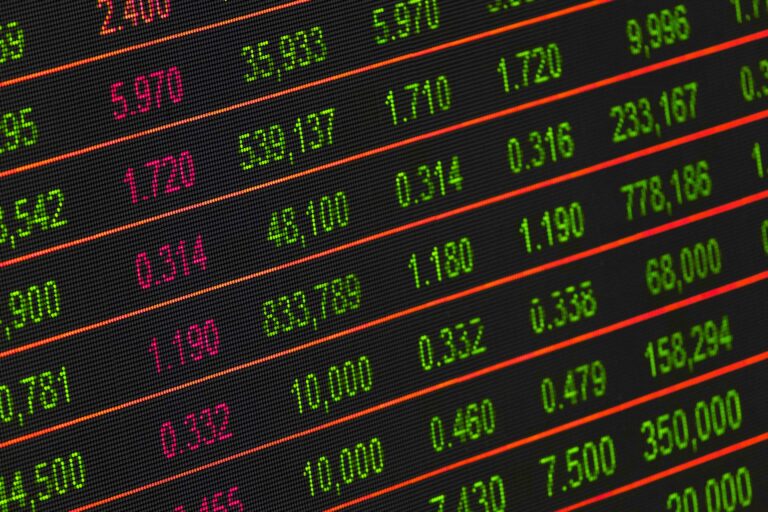September Review 2024
US
On 18th September the Federal Reserve cut US interest rates by 50 basis points, boosting the S&P500 to new all-time highs recording an intra-day peak of 5,767.37 – up 21.5% year-to-date. The long-awaited stimulus package arrived in line with expectations following revised US Labour Data and steadying improvements in consumer prices. September Non-Farm Payroll data came in lower than forecast at 142,000 jobs vs. 164,000 and the US Consumer Price Index fell by 0.4% as expected to 2.5% vs 2.9% previous. The Federal Reserve is predicted to make a further 50 basis point reduction by the end of this year. Chairman Jerome Powell has expressed growing confidence in a soft landing and signalled the central bank’s intention to revert to the conventional quarter point cut at their next meeting on 7th November if economic data remains robust.
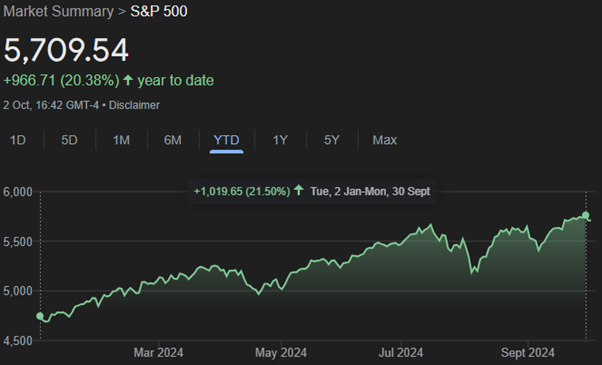
S&P 500 year-to-date
UK
Sentiment at the Bank of England remained cautious at its meeting on 19th September, Governor Bailey stated that interest rates are gradually on the path down, with an emphasis placed on falling inflation data before a future cut. On 11th September the Office for National Statistics reported GDP growth had remained flat for the month of September; lower than the 0.2% increase it had forecast.
The FTSE100 has traded a tight range of 8000-8400 since June, with consumer prices unchanged from August. The most recent annualised UK CPI for September printed at 2.2%. The Bank of England has previously stated that it expects inflation to rise to about 2.75% in the second half of this year following price rises in the service sector and strong wage growth across the jobs market – this is yet to be seen. Labour’s first Autumn budget is set for 30th October.
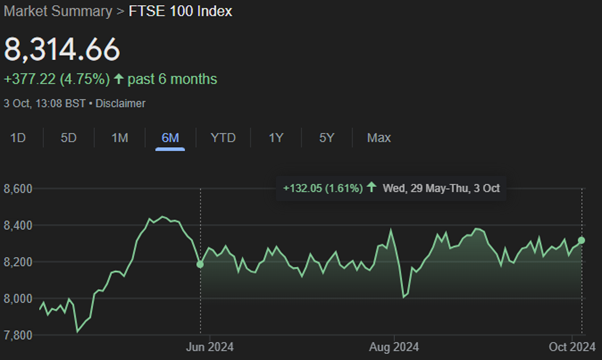
FTSE 100 over the past 6 months
EU
The Eurozone lowered its official interest rate by 25 basis points on 12th September, ahead of the Federal Reserve on the 18th. The European Central Bank warned that economic growth will be weaker than forecast. Higher-than-expected inflation data from France and Spain, and low Purchasing Managers’ Index figures across the Eurozone have prompted markets to begin pricing an additional 25 basis point cut in October despite the long-standing consensus anticipating a pause until December. Concerns amongst leading EU economists have shifted from inflation to growth, with in-house economists at Goldman Sachs, JP Morgan, BNP Paribas and T Rowe Price revising forecasts to say an October rate cut is likely.
Tomasz Wieladek, a leading economist at T Rowe Price, presented a case for a Trump election victory in November, with the ensuing geopolitical uncertainty and prospect of a trade war resulting in ECB cuts at every meeting until rates reach 2%.
China
China initiated its biggest stimulus package since the pandemic on Tuesday 24th September, in an effort to realign the economy to the CCP’s growth target. The faltering Chinese economy is expected to rebound following the measures. The Peoples Bank of China (PBOC) cut rates on $43 billion worth of one-year medium-term lending facility (MLF) loans to financial institutions by 30 basis points to 2% from 2.3%.
The Chinese Central Bank went one step further, cutting the amount of cash that banks must hold as reserves – the Reserve Requirement Ratio (RRR) – by 50 basis points.
The Hang Seng Index (HSI) and Shanghai Stock Exchange Composite Index (SSE), have both risen significantly since then, rallying by 18% & 17% in just one week following the news.
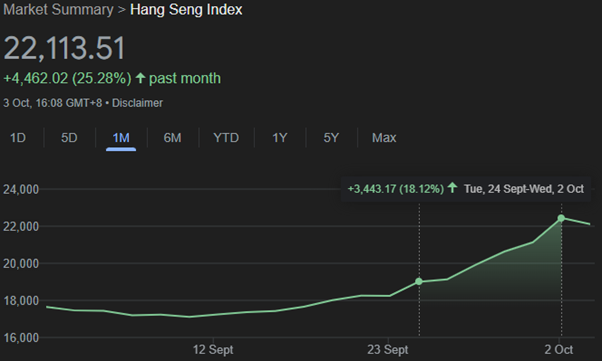
Hang Seng over the past month
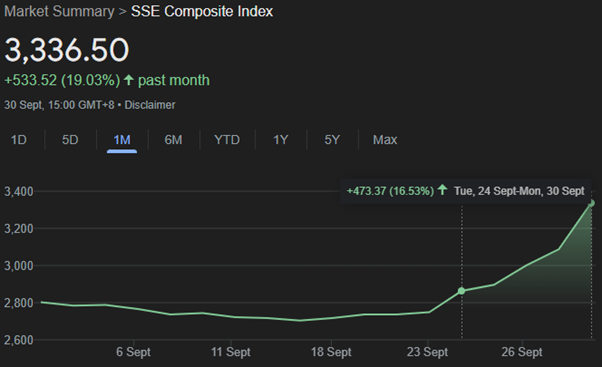
SSE Composite over the past month
Commodity Market
Thematically, de-dollarisation has continued in the Far East.
Gold has rallied further to new all-time highs, peaking at $2,668.91 per ounce on Thursday 26th September. Rising tensions between Israel and Iran have boosted commodity prices, as regional instability reached a climax following the remote detonation of pagers used by Hezbollah, and the killing of their leader Hassan Nasrallah.
Brent crude prices have since risen by over 12% from $69 to beyond $77.5 per barrel. Bank of England governor Andrew Bailey has stated that he is watching developments extremely closely amid fears that a worsening conflict could lead to a 1970’s style energy shock.
If you are interested in discussing your options, please contact the desk on 0207 466 5665.
